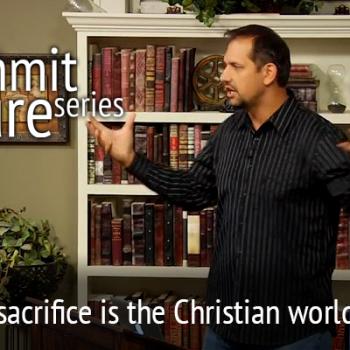
 Jesus in HD 156: The Most Profound Principle of Prayer I Have Ever Learned Play Now | Play in Popup | Download
Jesus in HD 156: The Most Profound Principle of Prayer I Have Ever Learned Play Now | Play in Popup | DownloadThis week, I have been reading a fascinating book of historical fiction entitled,The Robe, by Lloyd C. Douglas.
As you will hear in this PODCAST, in the book, Douglas records a conversation between Marcellus, son of a Roman Senator who has fallen out of favor with Emperor Tiberias, and Marcellus’ slave, Demetrius. The conversation goes like this:
‘Demetrius’—Marcellus swept the sky with an all-inclusive arm—’do you ever believe in the gods?’
‘If it is my master’s wish, I do,’ replied Demetrius, perfunctorily.
‘No, no,’ said Marcellus, testily, ‘be honest. Never mind what I believe. Tell me what you think about the gods. Do you ever pray to them?’
‘When I was a small boy, sir,’ complied Demetrius, ‘my mother taught us to invoke the gods. She was quite religious. There was a pretty statue of Priapus in our flower garden. I can still remember my mother kneeling there, on a fine spring day, with a little trowel in one hand and a basket of plants in the other. She believed that Priapus made things grow…. And my mother prayed to Athene every morning when my brothers and I followed the teacher into our schoolroom.’ He was silent for a while; and then, prodded by an encouraging nod from Marcellus, he continued: ‘My father offered libations to the gods on their feast-days, but I think that was to please my mother.’
‘This is most interesting—and touching, too,’ observed Marcellus. ‘But you haven’t quite answered my question, Demetrius. Do you believe in the gods—now?’
‘No, sir.’
‘Do you mean that you don’t believe they render any service to men? Or do you doubt that the gods exist, at all?’
‘I think it better for the mind, sir, to disbelieve in their existence. The last time I prayed—it was on the day that our home was broken up. As my father was led away in chains, I knelt by my mother and we prayed to Zeus—the Father of gods and men—to protect his life. But Zeus either did not hear us; or, hearing us, had no power to aid us; or, having power to aid us, refused to do so. It is better, I think, to believe that he did not hear us than to believe that he was unable or unwilling to give aid. … That afternoon my mother went away—upon her own invitation—because she could bear no more sorrow…. I have not prayed to the gods since that day, sir. I have cursed and reviled them, on occasions; but with very little hope that they might resent my blasphemies. Cursing the gods is foolish and futile, I think.’
Well, you could reason, of course Zeus did not hear Demetrius’ prayers. There was no Zeus to hear him.
And of course, you could also argue, there was no answer to his prayer because there was no Zeus who promised Demetrius what Jesus promised to us:
“So I say to you, ask, and it will be given to you; seek, and you will find; knock, and it will be opened to you. For everyone who asks receives, and he who seeks finds, and to him who knocks it will be opened.” (Luke 11:9-10)
Yet, how many of us have had a crisis of faith equal to that of Demetrius precisely because we prayed to our God in a time of crisis, in Jesus’ name, the same Jesus who did indeed make to us this promise:
“So I say to you, ask, and it will be given to you; seek, and you will find; knock, and it will be opened to you. For everyone who asks receives, and he who seeks finds, and to him who knocks it will be opened…”
…and yet, nothing happened.
What exactly did Jesus mean by those words, His prayer promise to us?
Some people claim that when Jesus spoke these words, He was merely addressing the asking, seeking, and knocking of the Disciples in attendance. But, He purposefully used the word “everyone” – which goes far beyond those twelve.
The most common explanation of Jesus’ promise is that God ALWAYS answers our prayers. Sometimes He answers “yes”, sometimes “no, and sometimes “maybe”. Then, sometimes He answers “wait”.
However, when I read Jesus’ promise in Luke 11:9-10, He doesn’t seem to be saying anything resembling a “no” or “maybe”.
Perhaps, if we are left questioning Jesus when we read verses nine and ten, it is important to read the passages leading up to His promise.
Now it came to pass, as He was praying in a certain place, when He ceased, that one of His disciples said to Him, “Lord, teach us to pray, as John also taught his disciples.” So He said to them, “When you pray, say:
Our Father in heaven,
Hallowed be Your name.
Your kingdom come.
Your will be done
On earth as it is in heaven.
Give us day by day our daily bread.
And forgive us our sins,
For we also forgive everyone who is indebted to us.
And do not lead us into temptation,
But deliver us from the evil one.”
And He said to them, “Which of you shall have a friend, and go to him at midnight and say to him, ‘Friend, lend me three loaves; for a friend of mine has come to me on his journey, and I have nothing to set before him’; and he will answer from within and say, ‘Do not trouble me; the door is now shut, and my children are with me in bed; I cannot rise and give to you’? I say to you, though he will not rise and give to him because he is his friend, yet because of his persistence he will rise and give him as many as he needs.
Perhaps the question as to how and if God answers our prayers begins with how Jesus said we should pray in the first place. This was the question that the Disciples asked which launched this whole discussion. They saw how Jesus prayed and the way it seemed to affect His life and they wanted instruction on how to pray “properly”.
Jesus taught them by first referring to God as “Father”.
Then He used the phrase “hallowed (or holy) be Your name.”
This is very important and treats God’s name as utterly uncommon – one of a kind, in fact.
In my opinion, this line, “hallowed be Your name” is the bedrock foundation of the entire Bible, upon which everything is built.
You see, when we pray along the lines of “God, hallowed be Your name”, what we are saying is “God, let my life, may I treat you today as utterly uncommon – as unlike any other god.
This passage and prayer have their roots in Deuteronomy 6:4, where Moses gave Israel what is known as the Greatest Commandment:
“Hear, O Israel: The Lord our God, the Lord is one! 5 You shall love the Lord your God with all your heart, with all your soul, and with all your strength.
Later, when Joshua and the Israelites eventually settled in the Promised Land, it was a region awash with pagan gods. Many centuries later, when the Romans conquered the land, they imported with them their pantheon of pagan gods.
So, by the time His Disciples asked Jesus how to pray, the land of Israel was littered with a variety of temples and sanctuaries dedicated to all these many gods. While they numbered in the droves, they basically broke down into two different categories: the gods of nature and the gods of the economy. In all actuality, this remains true today throughout the world. Wherever other gods are worshipped, they break down to being gods of nature and/or gods of the economy. To put it another way, they are gods of health or gods of wealth.
And, whether we are talking modern day people or ancient civilizations, when they prayed to their gods, they most often prayed for and begged for at least a “problem free life”, or at best a bountiful one.
Paul summed up this culture perfectly in Romans 1:21-25,
Yes, they knew God, but they wouldn’t worship him as God or even give him thanks. And they began to think up foolish ideas of what God was like. As a result, their minds became dark and confused. Claiming to be wise, they instead became utter fools. And instead of worshiping the glorious, ever-living God, they worshiped idols made to look like mere people and birds and animals and reptiles.
…So they worshiped and served the things God created instead of the Creator himself, who is worthy of eternal praise! Amen.
In stark contrast to all this, along came the one true God. The Creator of all. His people worshipped and continue to worship the Creator, not the things that have been created.
We worship the singular, uncommon, unique, true God of the Bible who transcends the sea, the harvest, fertility, the harvest, and life’s storms. In fact, He uses these these things – nature and the economy – to bring about His purposes in our lives.
To the Romans of Jesus’ day, their gods were nothing more than glorified good luck charms. Therefore, prayer to them was the same as someone who is superstitious rubbing a rabbit’s foot in the hopes that it would bring them good luck. And these “gods” of theirs existed in order to bring or withhold from their worshippers the problem free lives they wished for.
But we do not treat our God commonly like they did. Our God – the one true God – is worthy of so much more. So, we don’t pray to him wishing for a pain free, prosperous or problem free life as if He were an almighty genie in a bottle.
Yet, just as there were many who cried out to their pagan gods in such a way in the days of Moses and Jesus, still so many people today cry out to God only when their lives have hit or are about to hit the skids. Reducing God to a good-luck-charm, they wish that God would give them more money or better health.
But, when we pray “hallowed be Your name”, we don’t treat God commonly like this. This is why this posture and attitude – much less these words – are so incredibly foundational. Before we even begin a tremendously uncommon prayer, we need to understand that that the God we are praying to is incredibly uncommon, singular and holy; and that we pray for an incredibly uncommon reason.
In fact, when Jesus taught this same lesson (how to pray) to the multitudes in His Sermon on the Mount, He put it this way:
“…when you pray, do not keep on babbling like pagans, for they think they will be heard because of their many words. Do not be like them, for your Father knows what you need before you ask him.
This, then, is how you should pray:
‘Our Father in heaven,
hallowed be your name…’” (Matthew 6:7-9)
Did you catch that? We don’t really need to pray for what we believe we need. God already knows.
Many counter with “Wait a minute… Jesus went on to pray ‘give us this day our daily bread’. Isn’t that His example of how we should pray for how we should pray for our daily needs to be met?”
Firstly, we need to never pray from an attitude of entitlement – one that’s not like the pagans who, when they don’t get what they beg for, they get upset.
In the exact opposite fashion, we pray for only one reason: not because we want to be healthier or wealthier, but because HE IS GOD.
Whether or not He gives us a single thing, He is still worthy to be praised. And, the reality is that He has given us everything. For us, to be permitted into the presence of the Almighty Creator and Lover of our souls is enough, no matter what we are going through or how long we go through it.
Once this is settled, the rest of the Lord’s prayer makes so much more sense.
So, when we pray with a “heavenly minded” perspective: “your kingdom come”, we focus on God’s will for the future, not what we want for the presence. This is a reminder of what Paul wrote, just before his imminent death, in 2 Timothy 4:8,
Finally, there is laid up for me the crown of righteousness, which the Lord, the righteous Judge, will give to me on that Day, and not to me only but also to all who have loved His appearing.”
That’s Jesus’ promise we can take to the bank: that he is coming again on a day we can all pray for and strive for, just as He promised to His Disciples in the upper room:
I will come again and receive you to Myself; that where I am, there you may be also. (John 14:3)
That’s what we focus on – a future with Jesus – when we pray “Your kingdom come…”
And that day is coming!
So, then, when we read Jesus’ instructions on how to pray and He offers “Your will be done”, it is urgently important to realize that the primary purpose of prayer is not to convince God to bend His will to ours. Nor is the primary purpose of prayer to get God to change our life circumstances.
The primary purpose of prayer is to put us in a position where God changes us. That’s what prayer is all about. And God knows we need to be changed… from the inside out!
It’s not about what we want, but what God wants for us. In prayer, we submit to God’s will… and that is incredibly uncommon.
So, when we pray, “Give us this day our daily bread”, this does not mean that if we don’t say these words, God will make us starve. It is actually a daily reminder that God invites each of us, each and every day, to break bread with Him. It’s not about hunger pangs of the stomach, but it’s all about a commitment of loyalty, love, forgiveness, friendship that comes through breaking bread – true fellowship with the Almighty God!
In the same vein, when we pray, “forgive us our sins as we forgive those who sin against us”, our fellowship with God prompts us to forgive just as we have been forgiven.
Incredibly uncommon!
The common prayer would be for us to ask God to destroy our enemies, but Jesus actually set the example of saying “Father, forgive them. They know now what they are doing” as they were killing Him.
Finally, we are to pray, “Lead us not into temptation”. This doesn’t imply that without this prayer, He might actually lead us into temptation. Actually, if we look at what Jesus said to His disciples just before He was arrested in the Garden of Gethsemane:
“Keep watch and pray so that you will not give into temptation. The spirit is willing, but the body is weak.” (Matthew 26:41)
So, when we pray “lead us not into temptation”, it is an admission on our behalf of our weakness. We need God’s power to resist temptation
To sum up, the primary focus of prayer is not for God to change our circumstances, but to change us. We want God to change our hearts from being self-centered to being God-centered. We want Him to change our mindset, our priorities, and how we find contentment.
Therefore, in light of how Jesus has instructed us to pray, when He told His disciples (and us):
“…ask, and it will be given to you; seek, and you will find; knock, and it will be opened to you. For everyone who asks receives, and he who seeks finds, and to him who knocks it will be opened.”
Then His promise comes with new understanding when what we ask for, what we seek and what we pursue has been placed in alignment with His will.












